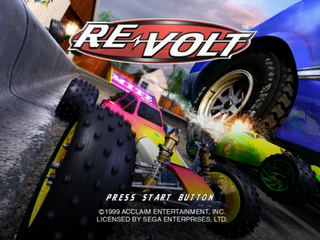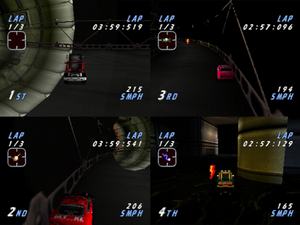Re-Volt
From Sega Retro
| Re-Volt | |||||
|---|---|---|---|---|---|
| System(s): Sega Dreamcast | |||||
| Publisher: US/EU Acclaim JP Taito/Acclaim | |||||
| Developer: Acclaim | |||||
| Genre: Racing | |||||
| Number of players: 1-4 | |||||
| |||||
Re-Volt is a remote-control car racing game developed for a variety of consoles including the Sega Dreamcast in 1999. The game features a number of remote control cars produced by the Toy-Volt company during the height of their popularity producing toys and games for children. Their latest RC Car line has produced toys with minds of their own and escape to the supermarket, around the neighborhood, over the roofs, and through the museum! Choose from a variety of battery and gas powered RC cars that utilize realistic physics with item power ups similar to the Mario Kart series.
The game includes 28 cars, 14 tracks, one which is exclusive to this version, and a track editor. Up to four players can play together in two different game modes.
In July 2010, after Acclaim Entertainment went bankrupt, We Go Interactive Co.,Ltd purchased the rights to Re-Volt from Throwback Entertainment, who had purchased the rights initially from Acclaim, and then produced a version of Re-Volt for iOS and Android which uses the Dreamcast version as the base for the port.
Contents
Gameplay
Controls
Control Stick/D-Pad - Turn Vehicle
![]() Trigger - Accelerate
Trigger - Accelerate
![]() Trigger - Reverse
Trigger - Reverse
![]() Button - Fire Weapon
Button - Fire Weapon
![]() Button - Change Camera
Button - Change Camera
![]() Button - Reposition Car
Button - Reposition Car
![]() Button - Flip Car/Rear Camera
Button - Flip Car/Rear Camera
Physics
The main draw to Re-Volt is the accurate physics model. So long as the wheels are touching a surface, the game will take into account its acceleration, weight, wheel speed and more to recreate the physics of an RC car. Cars will tumble, land on the side or flip over depending on the terrain it drives on. Going top speed through a turn will cause the car to spin out, slowing down before a turn allows the vehicle to take corners with ease. Hills can be the worst enemy of racers if they're not accounted for by driving as straight as possible. Corners can be drifted inside of to avoid loss of speed and time. Keeping the wheels on solid ground allows cars to maintain a top speed, while jumps allows for additional height, but loss of speed.There are buttons dedicated to setting players back on the correct path or flipping their car over.
Tracks will feature slight branches to allow for riskier shortcuts as well as alternate routes for reversed tracks with impassable paths and increase in complexity on the harder difficulties. Routes will be harder to take turns on due to varying heights and riskier paths to take and hazards to avoid such as pools of water.
The game also features two variants of the physics model which changes car collision. This can be changed in the options menu.
- Simulation - Features realistic collision against objects and other cars
- Arcade - Features simplified collision model to avoid cars betting caught up with each other or other objects.
The main game also features items that can help or hinder progress in a race that apply offensive and defensive tactics.
Game Modes
- Single Race - Allows to race against computer opponents for first place. Completing races associated with a cup unlocks additional cars.
This game mode is available in multiplayer mode for up to four players to race against each other.
- Championship - Race in a cup which consists of four races for points. The higher the rank the more points earned. However failing to finish 3rd place or above will cost a try. If all three tries are used, the championship must be restarted. Obtaining first in a cup unlocks additional levels and cars.
- Time Trial - This game mode lets you compete for the fastest lap time in any race thats unlocked. Successfully completing the number of races associated with a cup unlocks additional cars as well as reverse, mirror and reverse mirror variations of tracks.
- Practice - Allows to explore tracks with no time limit or other racers. In addition each track features a star to collect. Collecting each star from a track per cup unlocks additional cars.
- Stunt Arena - A small arena features 20 stars to collect. The arena features a loop, ramps as well as a half pipe with stars that can only be obtained with higher performing cars. Collecting all 20 stars unlocks a game mode.
- Battle Tag - A multiplayer only mode that features a star hidden in a battle level. Collecting the star counts down a timer for a player. The first person to have their timer reach 0 is the winner. The game continues until the last person fails to collect the star.
- Clockwork Carnage - Instead of 8 RC cars racing to the finish, its a 30 wind-up car race to the finish in any of the race levels!
Tracks
Tracks feature a variety of themes, including a suburban neighborhood, toy world, musem, supermarket, botanical gardens, western ghost towns, and rooftops, exclusive to the Dreamcast version. Completing Time Trial challenges unlock mirrored, reverse and reverse mirrored versions of the tracks, which provide a total of 56 playable tracks. In addition there are four different levels for the Battle Tag game mode as well as a stunt arena.
Bronze Cup
Silver Cup
Gold Cup
Platinum Cup
Other Tracks
*Dreamcast Exclusive
Cars
Cars are classified by different stats and ratings. The game starts off with a selection of Rookie rated cars. As the game progresses, access will be granted to Amateur, Advanced, Semi-Pro and Pro cars. Additional cars can be unlocked by winning races and cups.
There are two types of classes for a vehicle, Electric powered cars (Powered by batteries and Glow class, which are powered by gas engines.
Cars have the following parameters that affect their performance:
- Speed - The top speed of a vehicle
- Acceleration - How quickly the vehicle can reach top speed.
- Weight - The weight of the car affects the vehicle's acceleration and grip.
- Transmision - Vehicles can feature Four Wheel Drive, (4WD) Front Wheel Drive, (FWD) or Rear Wheel Drive. (RWD)
Rookie
Amateur
Advanced
Semi-Pro
Pro
Special
*Dreamcast Exclusive
Items
If items are left on in the options menu, racers can make use of ten different items that can turn the race around in or against the favors of the racers.
- Shockwave
- Firework
- Firework Pack
- Electro Pulse
- Bomb
- Oil Slick
- Water Balloon
- Ball Bearing
- Clone Pick Up
Track Editor
The track editor allows users to create their own tracks with an editor centered around blocks that can be placed in a custom sized grid. Several pieces have different skins to use, variations of slopes and heights to choose from and can be used in Single Race, Multi-Player, Time Trial and Practice game modes. Unlike the Nintendo 64 version, tracks can be traded by VMU and takes up to 7 blocks per level.
VMU Features
Re-Volt can utilize VMU storage to save game progress. It also allows to save user made tracks as well as export them to be found by the game's track select menu for Single and Multiplayer modes. Only exported tracks are playable in-game.
Physical Scans
| 73 | |
|---|---|
| Based on 31 reviews | |
| Dreamcast, US |
|---|
50x50px Inlay |
- ↑ File:ROD_DC_01.pdf, page 66
- ↑ 576 Konzol, "December 2000" (HU; 2000-xx-xx), page 45
- ↑ Arcade, "March 2000" (UK; 2000-02-29), page 94
- ↑ Consoles +, "Janvier 2000" (FR; xxxx-xx-xx), page 128
- ↑ Dreamcast Monthly, "January 2000" (UK; 1999-12-16), page 62
- ↑ DC-UK, "January 2000" (UK; 1999-12-17), page 24
- ↑ Digitiser (UK) (1999-12-16)
- ↑ Dreamcast: Le Magazine Officiel, "Mars/Avril 2000" (FR; 2000-xx-xx), page 76
- ↑ Dreamcast: Das Offizielle Magazin, "Dezember 1999" (DE; 1999-12-09), page 26
- ↑ Dreamcast Magazine, "2000-25 (2000-07-28)" (JP; 2000-07-14), page 20
- ↑ Dreamcast Magazine, "No. 3" (UK; 1999-11-25), page 50
- ↑ Dorimaga, "2002-18 (2002-10-11)" (JP; 2002-09-27), page 33
- ↑ Dreamzone, "Janvier 2000" (FR; 1999-12-16), page 80
- ↑ Electronic Gaming Monthly, "February 2000" (US; 2000-01-11), page 176
- ↑ Entsiklopediya igr dlya Dreamcast, "Izdaniye chetvertoye, dopolnennoye" (RU; 2002-xx-xx), page 187
- ↑ Famitsu, "2000-07-21" (JP; 2000-07-07), page 32
- ↑ Fun Generation, "01/00" (DE; 1999-12-22), page 79
- ↑ GamePro, "March 2000" (US; 2000-0x-xx), page 104
- ↑ GamesMaster, "March 2000" (UK; 2000-02-24), page 115
- ↑ GameZine (UK) (+0:00)
- ↑ Game Informer, "February 2000" (US; 2000-0x-xx), page 60
- ↑ GameWEEK, "December 8, 1999" (US; 1999-12-08), page 16
- ↑ Incite Video Gaming, "March 2000" (US; 2000-0x-xx), page 109
- ↑ Joypad, "Febbraio 2000" (IT; 2000-0x-xx), page 106
- ↑ MAN!AC, "02/2000" (DE; 2000-01-05), page 63
- ↑ Mega Fun, "02/2000" (DE; 2000-01-05), page 67
- ↑ Next Generation, "March 2000" (US; 2000-02-xx), page 89
- ↑ Official Dreamcast Magazine, "January 2000" (UK; 1999-12-09), page 80
- ↑ Official Dreamcast Magazine, "March 2000" (US; 2000-02-08), page 100
- ↑ Player One, "Janvier 2000" (FR; xxxx-xx-xx), page 111
- ↑ Revista Oficial Dreamcast, "Enero 2000" (ES; 1999-12-20), page 66
- ↑ Video Games, "01/2000" (DE; 1999-12-15), page 151
- 1-4 player games
- Old content rating field
- All games
- Old-style rating (arcade)
- Rating without PDF source
- Old-style rating (consolesplus)
- Old-style rating (dmuk)
- Old-style rating (odmfr)
- Rating without source
- Old-style rating (playerone)
- Old-style rating (rod)
- Use magref
- Update ratings template
- 6 old ratings
- Pages with broken file links














